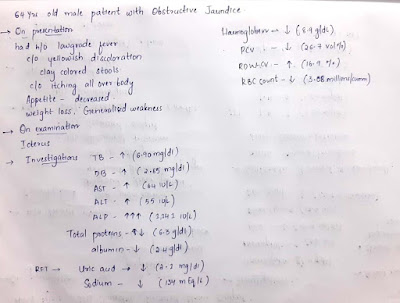Ch.Janani
Roll no. 29
Question 1
COMPLETENESS:
•The case presented is correct with accurate data
CORRECTNESS :
•The history of the patient,symptoms and signs have been listed well. The clinical images were provide with the laboratory investigations.
USEFUL LEADS TO ANALYZE THE DIAGNOSTIC AND THERAPEUTIC UNCERTAINTIES:
All the investigations lead to the diagnosis of the case and better treatment of the patient. Hence, no diagnostic uncertainties were found.
COMPLETENESS:
•The case presented is correct with accurate data.
•The case has completeness in all factors
The case begins with the chief complaint the history of presenting complaints in a chronological order, past history, personal history is written well the vitals have been explained.
•Icterus -present, oedema- present ,abdominal dissension are shown with images.
•All Investigations done are suggesting the provisional diagnosis and any changes occuring in the patient on every day basis and uncertainties around the diagnosis have been given.
CORRECTNESS:
The given data is correct
USEFUL LEADS TO ANALYZE THE DIAGNOSTIC AND THERAPEUTIC UNCERTAINTIES:
COMPLETENESS:
•The case seems incomplete
•Missing ones are
Date of admission
Segmentation of the case as chief complaints,history of presenting illness, history of past illness ,personal and family history.
• The history taking is in chronological order but a clear explanation can be given .
•Clinical images are attached including radiological findings.
CORRECTNESS:
The given data is correct.
USEFUL LEADS TO ANALYZE THE DIAGNOSTIC AND THERAPEUTIC UNCERTAINTIES:
The patient has chronic hemolytic anemia that is not ruled out in the patient's previous investigations outside the hospital
The patients investigations reveal bileduct dilation instead of doing costly procedures a permanent surgical procedure could be done.
CNS
COMPLETENESS:
•The case is complete with all necessary data
•The case log has details of the patient's complaints and history of present illness , past illness , all the investigations are shown with images .
CORRECTNESS:
The data provided is correct.
USEFUL LEADS TO ANALYZE THE DIAGNOSTIC AND THERAPEUTIC UNCERTAINTIES:
COMPLETENESS:
•Patient's treatment plan according to the status of the patient is not mentioned also discharge summary is missing.
CORRECTNESS:
The data provided is correct.
USEFUL LEADS TO ANALYZE THE DIAGNOSTIC AND THERAPEUTIC UNCERTAINTIES:
The therapeutic uncertainties can not be understood as the treatment done on each day of hospital stay is not provided.
COMPLETENESS:
•The case log has details of the patient's complaints and history of present illness , past illness , all the investigations are shown with images .
• no discharge summary
CORRECTNESS:
The data provided is correct.
COMPLETENESS:
•The case log has details of the patient's complaints and history of present illness , past illness , all the investigations are shown with images .
•any changes in the plan of treatment is not described.
CORRECTNESS:
The data provided is correct.
Question 2
Gastroenterology
All the investigations lead to the diagnosis of the case and better treatment of the patient. Hence, no diagnostic uncertainties were found.
All the investigations lead to the diagnosis of the case and better treatment of the patient. Hence, no diagnostic uncertainties were found.










Comments
Post a Comment